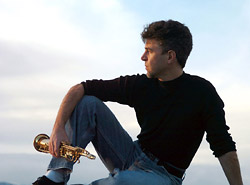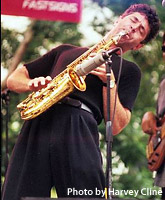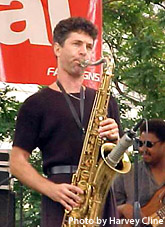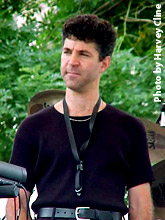February 17, 2005
Interview by Mary Bentley
Without a lot of fanfare, Nelson Rangell has been making and recording great music for over 17 years. He’s a multi-talented musician who plays saxophones, flute, and piccolo. Nelson is very excited about his new CD, My American Songbook – Volume I, which hits the streets next month. He took some time out of his busy schedule to chat with Smoothviews about this new and different venture.
 SmoothViews (SV): Let’s talk about your new CD – My American Songbook. I know you’re going with standard songs, and there are so many of them out there, but it looks like you chose these songs for specific reasons. I’m sure it was hard to narrow it down to these 10. SmoothViews (SV): Let’s talk about your new CD – My American Songbook. I know you’re going with standard songs, and there are so many of them out there, but it looks like you chose these songs for specific reasons. I’m sure it was hard to narrow it down to these 10.
Nelson Rangell (NR): I actually named the CD Volume I not so much because I necessarily plan on doing Volume II, III… and maybe those will be future projects… but because the fact of the matter is there’s many, many great songs by American composers and calling it Volume I is just indicative that these 10 were ones on some level that had some significance for me, and that I did feel were [a] pretty eclectic mix of material from a lot of different American sources and influences. You’ve got everything from bluegrass to Earth, Wind, & Fire.
SV: I see that you have “Sonora” on here, and I know that you did that previously on your Destiny CD (1994). This time it’s whistled. You say in the writings for this CD that everyone always asks for this version of this song. Did you put this song in as a gift for your fans?
NR: I did. There’s a pretty big difference. It’s something that over the years I had whistled. It started exactly as I wrote in the liner notes, that I had just whistled one night. It became something that people almost always asked for, and although I never had any great aspirations to become the next Slim Whitman or whatever, I had understood and felt like it’s a nice little human moment for people. Sometimes I had wondered why it was, why people liked it so much, quite aside from maybe the novelty of the person whistling. To see someone doing it earnestly, I think that’s something very human and so, it’s felt by everyone, and almost in its simplicity, I think people really respond to it. It’s almost always a very nice centering kind of moment in the show. It’s fragile and it’s vulnerable and it just has kind of a place of peace and people respond to it a lot. Nice, you know everything kind of flows down. I do it close to the end [of my shows] right before the big finale. (Laughs)
SV: Do you feel the time is right for a CD like My American Songbook?
NR: I think that all of the takes of the tunes are quite felt, and they’re quite unique. I think that they’re interesting takes on the tunes. I think that they’re not so usual, a good number of them. It’s funny because it’s an old concept. There’s nothing new about doing an American songbook record, but I do think that some of the tunes are quite personal, and I think it functions very well as a book, more so than a lot of CDs, in its entirety. It hangs together really well as a whole body of work. In that way, that’s really nice because I think people are very used to getting stuff that’s one or two tunes that they like. And on this one, I feel like there’s a thread throughout the entire project, from tune to tune.
SV: And what is that thread?
NR: Humanity. I think that from source to source in this record, [that’s] what remains common, because the tunes are quite different one from the next. And the instrumentation, I mean I’m playing a lot of different instruments. You’re going from bluegrass to rhythm and blues, to something that is Latin-influenced, to something that was a Broadway tune, and something that’s a straight-ahead jazz piece… and so, what is the constant? That through all this music, aside from me being a constant, is that a certain type of spirit runs through the whole thing. And my effort with this record is the constant, is some sort of continuing thread of humanity. That’s what I hope people are able to get. That from culture to culture and influence to influence that one thing we can always seek and hope to hear in music is something that kind of transcends maybe just labels. There’s too much division. There’s a lot of division in so many things in our country [and] in music. Sometimes you just wonder whether something is good music.
 SV: With this latest release you have 14 CDs out. Why is it that with number 14, this is the point for this type of CD at this time? SV: With this latest release you have 14 CDs out. Why is it that with number 14, this is the point for this type of CD at this time?
NR: I think that on this one, as I’m getting older and evolving as an artist, this [is the] kind of project where frankly I think I may be playing a little more than I have on past CDs. And [I] play a little more freely, with a little bit less concern for fitting something necessarily into a 3:30 version. One of the things about doing a standards record is that you’re doing wonderful material, you’re doing proven material. You’re taking a shot at things that maybe even have been called classic at one time or another. You’re sinking your teeth into known, proven, and wonderful material, so as an artist it’s just great to take your shot at how you would interpret these classics. And that’s a very inspiring thing… to play over these great vehicles, like playing over a Bernstein piece. That’s a pretty nice car to drive. Or try to drive well. I do feel that this record is fundamentally different than other recent efforts. On the simplest level there’s a lot more varied playing and a fair amount of improvisation happening on this - much longer and much more involved solos.
SV: I read the list of personnel on this album… Jimmy Haslip and Russ Ferrante, Kip Kuepper and Chuck Loeb. These are all really great musicians.
NR: They are great musicians. Kip and I have worked together forever, and Chuck and I have worked together forever. I’ve had the luck of meeting people early on, and I’ve had the good fortune of getting to work with a lot of these guys. Kind of the latest one is my young friend Alex Nekrasov who helped me produce this record and worked very extensively on it, and you’re hearing a great deal of his work on this record. He’s a wonderful, wonderful artist himself and a wonderful, wonderful producer. There are all these kind of old names, and there are new names that keep coming in, and Alex will be one of those. And I’m very proud to have worked with him.
SV: Russell does some really nice work on “Cast Your Fate to the Wind.” I’ve always loved that song. He does some really nice delicate kind of playing on that song.
NR: Isn’t that a lovely solo? It goes to some different places. You check out the original of that, then it’s interesting what people then do with it. That’s kind of in the nature of this project. It’s interesting to kind of sit back and listen to what you did.
SV: You play all kinds of instruments on this CD. Does the song dictate what kind of instrument you’re going to play or does the instrument come first and then the song?
NR: To some degree on a record like this, it’s not that often that someone plays five or six different voices on a record. So, it’s often not like the artist has to make that choice. They have their voice. They play tenor saxophone or they play alto saxophone. A lot of times I do think that it’s an obvious choice as the arrangements are made, or you heard something right off the bat, and you always knew you were going to play it on tenor or piccolo. But sometimes there are some where it’s very up in the air. For instance, on “Cast Your Fate to the Wind” I had played that arrangement on flute, and I had played that on soprano, and I thought that the soprano was a warmer choice. And I thought it was an arrangement that the type of warmth and poignancy of that horn and that sound was much more apropos for the arrangement. The flute’s kind of very nice on it too, but there was something registering that was nicer about the soprano. So, the answer to your question is, it just kind of speaks to you.
 SV: Do you have a preference as to what instrument you play? SV: Do you have a preference as to what instrument you play?
NR: One of the lovely things for me, as I’m playing everything, is I really love playing all of them. They all kind of express different things, and so it’s nice to have the different paint brushes. I don’t favor one more than the next. They all present a certain sort of challenge.
SV: You come from a very musical family. Was there ever any doubt that you’d become a professional musician?
NR: I didn’t pick up an instrument until I was about 15. The answer to your question is after I started to play an instrument, I knew immediately that that’s what I wanted to do, ‘cause I did very little else after that. I just wanted to immerse myself in it all the time. It was my passion. To be able to find that early on, and know what you want to do, that’s a lucky thing. I became very directed in that way after I started playing the flute. Not too many people know what they want to do, I suppose, at that age, but it sure did give my life direction. And I don’t know if anything was predestined or whatever, but it would appear that all the kids in my family became musicians, so there was something going on in the gene pool. Neither of my parents are musicians, although both of them… my father’s not around anymore… they were both very aesthetic people. I never really considered other stuff once I started to play. I mean, that was my direction for sure. It was pretty much my direction after playing for a week.
SV: Jazziz magazine took a poll in one of their issues and you were ranked as one of the most underrated musicians in the business. What does that say about you, your fans, and the music business?
NR: I’m glad to be appreciated. I can’t speak for that body of people who wrote in, but I guess that it’s nice if there are those who feel that I could get a little more ink or something, that’s fine by me. For me, it’s just a day-in-and-day-out thing, and if I pick up appreciation from folks, I’m happy to get it. I’m working hard to do good work. You don’t exactly know what the audience will let you do, but of course you’re hoping to always expand the audience. There’s no question that I want to expand the audience doing something that I feel very solidly behind and proud of. You want to feel that if they came or if they shelled out $15 for your record, that they got something good. You want to be able to hand something to people who know that you felt good about someone spending their hard-earned dollars or their important time… sharing that with you. And so, yes, I certainly hope that the audience will expand, and I’m working hard so that they’ll get something good. That’s my responsibility. To make sure I serve them up something that’s good for them. (Laugh)
SV: In an interview with Smooth Notes and News probably about two - three years ago, you said, “As artists, we have an opportunity to do good for people with music, something positive and therapeutic. Music should heal, and not anesthetize. Music should make you feel a wide range of feelings; happy and sad, mirth and laughter, thoughtfulness and grief. Music is life.”
NR: Whoa! That was deep! (Laugh)
SV: Yes, it was. “Music is life.” What does that mean?
NR: For the musician, the music one makes is, to a degree, the sum or some significant expression of his or her experiences. I think music is most powerful when the listener identifies with what they are hearing, and maybe through the music feels like those emotions resonating in a guitarist’s strings or a saxophonist’s reed are ones that are shared and resonate in their own hearts and lives. It’s like having a great conversation where you feel the other person really understands! Or you understand! On a deeper level, art should reflect the many different aspects of our lives and feelings. I think  ideally, it should reflect and take us to different places as we look at it, read it, or listen to it. When you go to a museum or a concert, you might want to just relax, but I think you should also go to have your senses awakened, energized, even provoked so you can think and feel more. I’ve watched and listened to Pat Methany in concert take the audience through such a range of experience and emotions that it was just incredible. The broadness of our experience in our lives is up to us. Two people can look at the same sunset or the same picture, and one individual can have a much deeper experience. It’s kind of up to us. I think we all want our lives to be full, spiritually and emotionally, and I think we all benefit when we are open to and invite different experiences into our lives. Music and the arts can be a profound medium for new thoughts and experience, and through music and the arts we can become more alive. So music and the arts give voice and vision to life. ideally, it should reflect and take us to different places as we look at it, read it, or listen to it. When you go to a museum or a concert, you might want to just relax, but I think you should also go to have your senses awakened, energized, even provoked so you can think and feel more. I’ve watched and listened to Pat Methany in concert take the audience through such a range of experience and emotions that it was just incredible. The broadness of our experience in our lives is up to us. Two people can look at the same sunset or the same picture, and one individual can have a much deeper experience. It’s kind of up to us. I think we all want our lives to be full, spiritually and emotionally, and I think we all benefit when we are open to and invite different experiences into our lives. Music and the arts can be a profound medium for new thoughts and experience, and through music and the arts we can become more alive. So music and the arts give voice and vision to life.
SV: What do you feel is music’s purpose in the world?
NR: For me, I appreciate when music reminds us of our common humanity. In all the places that I’ve been, it’s interesting to see what is different about people and also great to celebrate the good things that are the same and consistent. Music can really affirm our oneness with each other. That is not a singular goal with music, but it’s where its possible benefits are concerned. Have you ever gone to see a concert that was more than just good, it was like you were really touched by it, and everyone else there was also? Like people left the [venue], and they were all just better for having seen this show? Where you knew people were uplifted? It’s incredible when it happens, inspiring. Music can change people. Sometimes when we hear some of our favorite songs they can take us to very important moments and times in our lives. It can be very personal. Sometimes you can feel like Luther or James Taylor were singing just to you. Music is an ongoing discovery and an attempt to be part of something bigger than yourself. It’s an enormous gift for us all.
SV: What’s in the future for Nelson Rangell?
NR: I think that this latest CD is fairly different, and I think that it’s a new step and new involvement for me. I’m very appreciative of the fact that Koch [Records] let me at least attempt to grow and follow my own muse. I want to keep practicing and working hard such that there will be clear involvement happening on all these future projects. I hope that I’m able to continue to grow as an artist and get better, and hopefully have more to say and tackle more interesting and challenging and fulfilling music.
SV: Well, that’s a good way to end. Thanks Nelson.
NR: You’re welcome.
For more on Nelson Rangell visit Nelson's website: www.nelsonrangell.com.
top of page
|

